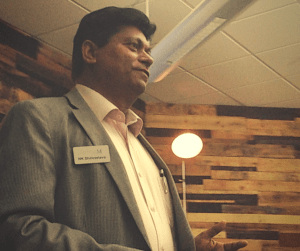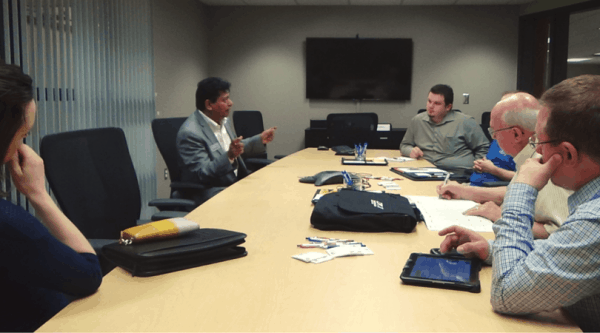Q&A with NK: Beginnings in Project Management
/*Q&A with NK: Beginnings in Project Management

This post is the first in a Q&A series with RefineM’s CEO and founder, NK Shrivastava. With over 25 years of experience in project management, NK has a lot of wisdom and experience to share. Throughout this series, we will ask NK about his experiences in project management and agile to discover and share what he has learned. In this post, we’ve asked NK to share his experiences from the beginning of his career in project management to now. We hope that you will be able to learn more about NK and how his career has helped shape him into a project management consultant and the CEO of his own company. We hope you will enjoy our first Q&A interview with NK, “Beginnings in Project Management.”
If you have any questions for NK, please feel free to write them in the comments.
Q: NK, how did you get started in project management?
A: I did not plan for a career in project management; it just happened. When I started my career, I was in hardware maintenance, maintaining computers. Three or four years into it, I got bored and went into software development.
While I was doing software development, there was an opportunity that came up in the telecom R&D organization I was working with. They had a position open for the head of their MIS (Management Information System). I said, “I’ll take it!” There were about 8-10 people in the group; I started managing their work and talking with the customers. My new position consisted of in-house application development and managing this team. This new job allowed me the opportunity to develop from a technical guy into a project manager.
I thought that I needed some education, so I went back to school and got my MBA. That was really helpful. In the early ‘90s, I started reading literature about project management and that is how I got started.
In ‘95, a company offered me a job as a senior project manager. This is how I got started doing project management in a more formal manner. In this position, I was managing client projects, with most of the clients located in the United States. I used to travel from India to the United States and work with our clients and my team. It was all off-shore development. I would come to the United States with one of my business analysts or leads. Together we would go and meet the customer, understand the environment, develop requirements, get their sign-off – and as a project manager, I would get their SOW signed off. Then we would go back to India, work on the project, and then when the project was finished, we would come back to the client. I would travel from India to the United States again with one of my leads. We would get the acceptance testing done, and deliver the project. I basically worked from the contractual perspective and client-expectation management perspective. I managed several projects in this role and delivered them successfully. Everybody was very happy with that. That’s how my career in project management got started and formalized.
Q: What were some of your struggles as a new project manager? Or moving into the project manager role?
A: When I was doing in-house application development, the biggest struggle was to get the user’s time to sit down with me and my folks to give us the requirements in order to do testing before we were to put the applications into production. Getting customer’s time in an in-house environment was extremely difficult. I used some of my interpersonal skills and planning skills to get this time, but it was definitely the biggest challenge.
When I went to the outsourced environment where we were doing projects for a customer, the biggest challenge was managing scope. Customers would sign off, and then they would come up with new requirements, and many times they would not agree that this was a new requirement, they would try to push it within the existing scope. The way I got around this was to do a walk-through of the requirements with all stakeholders and customers, make sure everybody understands them, and then take a sign-off. Then, start providing them the prototypes, or not even fully developed systems – maybe send them a screenshot and see if they agreed on that. The projects were all done using waterfall – at that time I was not using any agile methods – but it was doable.
Q: When was the moment you realized that project management was the career for you?
A: I started my fourth job in the United States with a company in North Carolina. I was very interested in doing pre-sales, but they hired me as a Senior Project Manager. So, the owner of the company said I could do both. So, I was doing two things – managing a large project for a big-name insurance company, as well as supporting the sales folks who went out and got new projects. I was helping the pre-sales folks with solution design, estimation planning, creating the SOW, and things like that.
Then it came time for my one year review at the company. My boss and I were doing the review, talking about how the year went. During that meeting, he helped me realize that I was highly successful in managing that large insurance project, but I was not so successful in pre-sales support.
He helped me realize that there are some natural strengths that I have in project management. In order to develop my career, or grow, there are two ways I could go about it. Either I could work on my weaknesses and make them strong, or work on my strengths.
The first possible option was to create a role that was based on my strengths. If you find a role or job that is based on your strengths, it will be easier for you and more enjoyable. The second option is to work on your weaknesses, which isn’t as fun. My boss said, “We can talk about your strengths in project management, or your weaknesses in pre-sales; you can choose whatever you want.”
I told him, “Let me think about this.” I thought about it and decided that project management was the thing for me. I decided to get my Project Management Professional (PMP#&41;® certification that same year. That is when I started growing my career in project management.
Q: Was there ever a moment where you might have hesitated in your career transition to project management? Or did you just move ahead with full force?
A: No looking back, just moving ahead full force. I never even thought about anything else.
Q: Which aspect of project management do you like most?
A: I’m a big people-person. Working with people – that actually inspires me and keeps me going.
Q: What would you tell someone who is wondering if project management is the right career path for them?
A: I think there are some basic personalities that you need to be effective in project management. You have to be highly organized – that’s very important. The second thing is that you should be able to clarify things for people – bring clarity to everything related to the project. Clarity about scope, about user requirements, time, cost, expectations, why we are doing this project, etc. So, absolute clarity and you should be able to communicate that clarity. With that, communication becomes very important. Then there are people skills – this is extremely important because a project manager works with people all day. So clarity, organizational skills, communication skills, people skills, and follow-up skills. If you have those kind of basic traits (or you are willing to learn them), then you can be a successful project manager.
Q: If you could leave our readers with one tip to succeed in their project management career, what would it be?
A: If you want to succeed in project management, or in any career, don’t give up. The definition of failure is giving up. It’s not failure if you don’t succeed with one or two projects; it is failure if you give up. So, don’t give up! If you want to have a successful career in project management – or a career in any field – just keep working at it.
Q: Is there anything else you would like to add?
A: Yes. For any career – particularly a project management career – relationships with people are key. If your relationships are strong and you have relationships with many people, then it is very easy to succeed. Make and keep relationships.
Thank you for joining us on our first Q&A with NK. Stay tuned for our next Q&A!
How did you get started in your project management career? Are you thinking about a career in project management, but aren’t quite sure how to take the leap? Do you have any questions for NK? Let us know in the comments!
